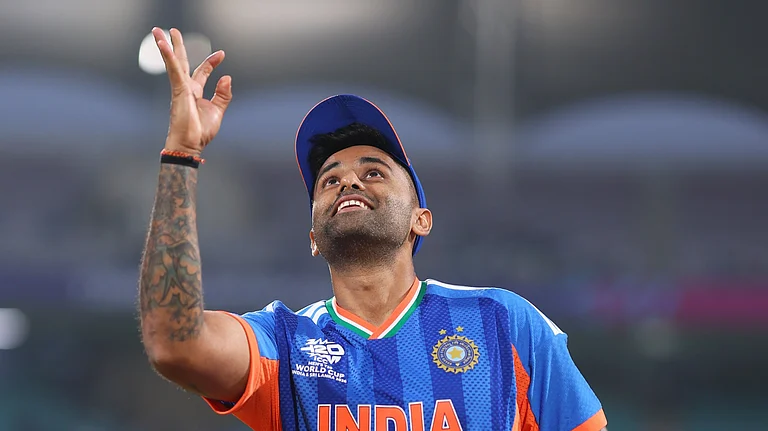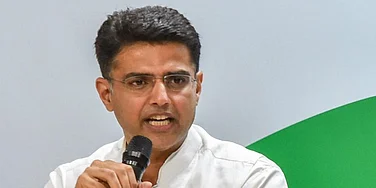- Mayawati still ahead but neck-and-neck with the Samajwadi Party
- Upper castes not as enthusiastic as they were in the assembly elections two years back
- The BSP will have to fight anti-incumbency, at least in some regions
- In 2007, the voters, tired of the lawlessness, wanted Mulayam Singh out and had voted for change
***
It didn’t matter where I stopped, a tea stall in a kasba, a remote village or a district court, a few "panditjis" (Brahmins) would surface within seconds and take over the conversation. Oracle-like, they would declare that Mayawati was coming to power as she was the only one who could check the rampant crime. Given the influence Brahmins wield in creating public opinion, Mayawati had clearly found herself a powerful weapon of mass communication.
Two years later, as I take the same route—Lucknow, Kanpur, Allahabad, Bhadohi, Varanasi, Jaunpur, Azamgarh, Gorakhpur, Basti, Faizabad and back to the state capital—the Brahmins have fallen silent, speaking only when spoken to. Curious, given Rajya Sabha MP Satish C. Mishra is the second most powerful person in the state, Brahmins hold top jobs in the administration right down to the police stations, and Mayawati has given 20 tickets to the community, double their strength in the state. Compare that with just 17 tickets to Dalits (in the 17 reserved constituencies), even though they are much larger in number.
The conversations, this time, are different. They are about uncontrolled corruption, the shoshan (tyranny) of the thanedars, the large number of dabang (musclemen) candidates the BSP has fielded—and above all, about Mayawati’s "megalomania". The last is visible in plain sight, reflected in the gigantic statues of herself, mentor Kanshi Ram and other Dalit heroes that dominate the once-nawabi Lucknow landscape. The stories are also legion—the most telling one is how the state government had a Mayawati figurine demolished under cover of darkness as it was considered too small, replacing it with a larger one. As you drive through Lucknow, there are more ready for unveiling, for now ghostly figures shrouded in blue tarpaulin.
But if her critics feel the statues and parks only reflect her "imperial vision", her constituency, the Dalits, see them as symbolic of the "maan sammaan" (respect) Behenji’s chief ministership has brought to them. At the BSP office in Varanasi, I ask a shabbily dressed party activist sitting amidst piles of party literature whether he doesn’t resent the fact that wealthy upper castes are being given party tickets. His answer is simple: "Behenji has given us sammaan, that is enough for me. When I started out, it was difficult to walk on the streets carrying a party flag; today, I can walk with my head high. Besides, someone like me who has trouble organising four square meals a day, how would I contest an election?" That’s the point, I persist, surely Mayawati could finance party loyalists. Pat comes the reply: "Jinka jitna tayyari, utna unka bhaagedari (roughly, each according to his capacity)." Clearly, symbols and slogans play a key role in keeping Mayawati’s base vote intact.
So, if there is no breach in the BSP’s core vote, and the ‘malaidar’ posts are going to the Brahmins, why the lack of enthusiasm forMayawati? Former Kanpur MP and CPI(M) leader Subhashini Ali explains, "Just as the talk of Mayawati being a possible prime minister has consolidated her vote base, it has weakened her sway among the Brahmins and other upper castes...they don’t want to see her as PM." So how will the Brahmins vote this time? They will vote for the BSP only where the candidate is a Brahmin because they want to increase the community’s numbers in Parliament.
The scenario is quite plain in these elections: for instance, in Jaunpur, the BSP’s Dhananjay Singh is fighting hard to secure Brahmin support, by day veering towards the BJP’s Seema Dwivedi. On the other hand, the BSP’s Vinay Shankar Tewari—son of mafioso Hari Shankar Tewari—is providing the first serious opposition to the BJP’s Yogi Adityanath in Gorakhpur. At a late evening streetcorner meeting, the fiery Yogi leads a frontal attack on Tewari and warns him not to divide the community "along caste lines". He is clearly rattled.

All for one, one for...: Mulayam’s tied up with other OBC groups, but will it be enough?
Of course, the complaints against Mayawati’s government are exaggerated by her detractors. A wealthy carpet exporter in Bhadohi with links in the SP concedes, "Her government is much better. She may have nominated a few mafia dons, and there is corruption in the police but the general air of lawlessness has gone." A view echoed by Padma Singh, a college lecturer in Allahabad.
And what of the Muslims? Well, while they will vote for the strongest anti-BJP candidate, there is certainly a greater inclination towards the BSP this time than in the past. For one, giving tickets to the Ansari brothers, Mukhtar in Varanasi and Afzal in Ghazipur, and to the other Muslim MPs who were driven out of the SP in western UP—such as Shafiqur Rehman Burq—has made Mayawati more acceptable. And her use of the NSA against the BJP’s Varun Gandhi has also gone down well in all but the die-hard SP pockets such as the Allahabad belt. Not just that, Muslim religious leaders, whether in Lucknow, Varanasi or Gorakhpur also appear to be tilting towards the BSP. "These leaders," an ips officer explained, "have a lot at stake in terms of waqf land. They like to back the person in power." Also, of all the parties, the BSP has given the largest number of tickets to Muslims, roughly equivalent to their share in the population.
***
Performance in Lok Sabha elections 2004

***
Meanwhile, in the SP, there’s a feeling that "this is a battle for political survival", says an official who has observed Mulayam Singh at close quarters "He’s going all out. He needs to be part of the next government at the Centre." This election, the Yadav chieftain is trying a new experiment—OBC consolidation through a pact with former BJP leader Kalyan Singh, who represents the Lodhs. Will this affect his Muslim base? Well, there is annoyance at the tie-up, as also of his criticism on the use of NSA against Varun and his shabby treatment of Muslim leaders in the party (reportedly at the behest of lieutenant Amar Singh). Zafaryab Jilani, lawyer for the Babri Masjid Action Committee, says in Lucknow, "Certainly, affection for Mulayam among the Muslims has diminished...but the SP will get Muslim votes wherever it looks as though it is the only one which can defeat the BJP." In Allahabad, the SP’s Reoti Raman Singh appears to be the frontrunner against the BSP’s Ashok Vajpayee, largely because the Muslims are turning out in full strength for him.
Another factor working in Mulayam’s favour is the desire of the people to see a Congress-led UPA government at the Centre again. While this certainly means that the Congress vote percentage may increase in these elections (with perhaps a couple of more seats), the main beneficiary of this will be the SP. In Lalganj, where the Congress has not put up a candidate, locals say the "party vote will shift to the SP". Muslims, in particular, are keen to see a secular government in Delhi and see the SP as a Congress ally. If the sentiment works, the SP—which will certainly come down from the 37 seats it got in 2004—could be just a few seats behind the BSP.
The least enthusiasm in this elections seems to be for the BJP, barring Gorakhpur and the surrounding constituencies (where a combination of Yogi Adityanath’s private army, the Hindu Yuva Vahini, the Ansari brothers and the Batla House encounters affected Azamgarh play a part). The Hindutva project has lost its appeal, especially after the BJP failed to build the Ram temple when it was in power. Also, L.K. Advani’s prime ministerial candidature finds few takers. In the Kanpur district court, avowed BJP supporters are wistful, "If only Vajpayeeji was still the PM candidate...." After Vajpayee—and here’s the surprise—the people’s vote for the next PM is for Dr Manmohan Singh! Clearly, decency and integrity can pay in politics, even in the caste cauldron of UP.






















